- Home
- Veronica Roth
Chosen Ones Page 6
Chosen Ones Read online
Page 6
There were always people camped around Drain sites, but Sloane never got used to them. They were all fanatics, but there were distinct groups among them—wannabe magic-users, usually, but also those who were desperate with grief and seeking spiritual healing and, the worst of the bunch, Dark One acolytes who wanted to bring him back.
Matt was on the phone, calling Agent Henderson for help, Sloane assumed, because there was no way they could drive through the wall of tents ahead of them. He stopped the car and waited at a safe distance from the crowd.
“Agent—yes, hello, it’s Matt Weekes,” he said. “Fine, thanks, and you? Great. We’re here, but there’s a bit of a problem—ah. Okay, thank you.” He hung up. “They’re sending a golf cart.”
“I am not diving into that bowl of mixed nuts in a golf cart,” Sloane said. “Can’t they clear a path or something?”
“Apparently they’ve tried that and were unsuccessful,” Matt said. Those were the first words he’d spoken to her since an “Excuse me” that morning in the kitchen. “So we either go on foot or in the golf cart.”
“You forgot about secret option three,” Sloane said, “which is to turn around and go home because HenderCho never wants anything we want to give them anyway.”
“Slo, it’s not gonna be that bad,” Ines said. “Promise. We’ll even let you sit up front.”
“Oh, joy,” she said.
“Bring your potato-chip bag,” Ines suggested.
The golf cart arrived a few minutes later, one of the long ones with multiple rows of seats. The driver was in his early twenties, an eager man with sandy-blond hair and a firm handshake. He introduced himself as Scott, then directed Matt to a parking area and invited them all to climb into the cart. Sloane took the front seat she had been promised, sliding across the squeaky beige vinyl so Scott could get in beside her. The others piled in, and the cart lurched toward the tents.
“Sure is lively out here, huh?” Scott said, grinning. “Reminds me of a music festival, only—”
“Even worse outfits?” Sloane said, grabbing the handle on her right to steady herself as Scott whipped around a corner.
Up ahead was a circle of people in loose-fitting clothing sitting cross-legged. In the middle was a young woman lying with her hands over her heart. As Scott drove past, Sloane spotted a purple crystal in the woman’s hands, held against her sternum. Sloane rolled her eyes. A séance, probably. A lot of people thought that the barrier between life and the afterlife was thinner at places like these, places where so many had died, so they came here to speak to their lost loved ones.
Just beyond the séance was a tent with an altar in front of it, a stick of incense dwindling in a dish atop it. At another tent, a besom—a kind of broom used in Wiccan rituals—was leaned up against a massive pentagram painted on the side of it. All around were different-colored stones wrapped in twine or laid on low tables. The smell of patchouli was thick.
“The air always feels weird here,” Matt said. “Like a storm is coming, only it never does.”
“Possibly you’re just getting a contact high,” Albie said. “Pretty sure that’s not all just incense.”
“No, that’s not what I mean,” Matt said.
“I feel it too,” Ines said from the very back of the golf cart. “Makes me dizzy.”
They drove past a shirtless old man playing a pan flute. He spotted them and, startled, dropped the instrument into his lap. Sloane saw Matt touch his finger to his lips to ask for silence. He always did that to stop people from going wild at the sight of them. It worked about half the time.
For all that Sloane was annoyed by people like this, people who thought being close to such horror and destruction would give them superpowers or make their wishes come true, she didn’t have a real problem with them. And that was because the third set of people who gathered around Drain sites were so much worse by comparison: Dark One acolytes.
These were no well-meaning Wiccans, no modern druids in robes, no tarot-reading psychics or astrologists trying to figure out the position of Mercury (in retrograde at the moment). They were the kind of people you could walk past on the street and never look twice at, mostly men, almost all of them white, wearing blue jeans, and running secret websites about how the Dark One was misrepresented by the media, how all he had wanted to do was balance out the world’s population so they wouldn’t continue to devour Earth’s resources or cleanse North America of its impurities, all racist vitriol disguised as reverence for a dead man. And worse than all that was that they wanted to bring him back, as if he wouldn’t just murder every last one of them if he returned.
Sloane spotted a group of them roasting hot dogs over a portable grill and gritted her teeth. The tent behind them bore the motto that made Sloane choke on bile: MAKE THINGS RIGHT—BRING HIM BACK.
Make things right was the worst part of it. They thought Matt—the rest of them too, but mostly Matt—was the wrong that needed to be righted, the real evil that the Dark One would eradicate, ushering in some kind of white supremacist utopia.
Right before they passed out of sight, one of the Dark One worshippers recognized them, pointed his hot dog in their direction, and shouted, “Murderers!”
“Fantastic,” Matt said over Sloane’s left shoulder. “Scott, can this thing go any faster?”
“No, we’re pretty much maxed out,” Scott said. “But we’re almost there, don’t worry!”
Sloane felt her heartbeat behind her eyes. One of the men was coming toward them, hot dog in hand, ketchup smeared all over his fingers, and maybe he was shouting, she wasn’t sure, because her ears were ringing.
Hello, Sloane. Did you get some sleep?
“What did you say to me?” she yelled at the guy with the hot dog.
“You heard me!” the man snarled. “Fucking bit—”
“Slo.” Ines’s hands were on her shoulders. “Don’t jump out of the cart, please.”
“Those—fucking—”
“Yeah, I know,” Ines said. “But everyone and her mother has a smartphone and the ability to record video of you wasting some pasty idiot with an inferiority complex, so—”
“Here we are!” Scott chirped like nothing at all had just happened. “We’ll just whisk you through security, and I’ll get in touch with Agent Cho.”
Sometimes Sloane wondered if the world had been worth saving.
8
SOMETHING WAS THERE.
Sloane felt it as soon as she passed through the doors.
Being inside the geodesic dome that housed ARIS’s public-facing front corporation, Calamity Investigation and Restoration (CIR), felt like being inside a giant golf ball. The structure was massive and white, the roof made of small triangular panels that held together in a curve. Fluorescent lights shone between the panels, so the whole place glowed like a Halloween decoration, making everyone’s skin appear green. The people who rushed back and forth inside it wore either the standard government garb—black or gray suits with boring ties and sleek hair—or white hazmat suits with the hoods down.
Agent Henderson waited for them by the entrance, checking his bulky watch. He held a leather file folder against his chest. When Sloane had first met him, right after Bert’s death, he had been the definition of strapping—tall, muscular, and energetic—but he had gone soft around the middle since the Dark One fell. There was gray mixed with the red-brown of his beard now. He had a wife and two children, a mortgage, and a retirement plan.
“Hey, guys,” he said with a grim smile. Sloane squinted at him a little. He looked . . . not right. Or maybe that was just the unsettled feeling inside her talking.
Something was there, in the Dome. She could still feel it.
“How was the golf cart?” Henderson asked.
“One hell of an engine in that thing,” Albie said.
“Yeah, how much torque does it get, like three hundred and sixty-nine foot-pounds?” Ines said. “And the RPMs!”
“I forgot about this little comedy tag team
,” Henderson said, waggling his finger between Ines and Albie. “See anything weird out there?”
“We passed a séance in progress, but that seems fairly standard for that crowd,” Matt said. “Has anyone managed to speak to the dead yet?”
“Allegedly,” Henderson said, shrugging. “Pretty sure it was a hoax, but I won’t rule anything out anymore. You okay, Sloane? You don’t look so good.”
Magic, that was what it was. It had to be. She felt that tingling in her chest, right behind her sternum. But she had never felt magic at a Drain site before. She was more likely to feel the opposite, a kind of limpness in the air, like something had wilted.
“Thanks,” she managed to say to Henderson. “Just what everyone likes to hear.”
They said goodbye to Scott, who gave a cheerful wave before returning to his golf cart, and Henderson led them across the springy temporary floor—gray—down an equally gray hallway with temporary walls hemming them in on either side. It had been ten years, but the structure still looked like it had been set up only to be taken down. There were no offices, just long tables packed with computer monitors and tangled cords.
If the Drain site was a bicycle wheel, they’d started off walking its circumference, then turned down one of the spokes and were walking toward the center.
As they neared it, Sloane saw that the middle of the site was surrounded by glass panels from floor to ceiling. Clusters of floodlights aimed white beams inward. Whatever was left of the Drain site, ARIS wanted to get a very close look at.
But it was not the source of the magic Sloane felt. The prickling spread from Sloane’s chest to her abdomen. She tried to focus on the meeting room Henderson had taken them to, where his partner—Eileen Cho—waited. She was spinning a closed laptop in circles on a table. The right wall was all windows, showing the Drain site, where dozens of workers in the typical white hazmat suits walked along the edge, gesturing at each other and taking samples with metal tools.
The Drain had driven a crater deep into the ground, so deep that some of the workers looked child-size from where she stood. When Sloane first saw a Drain site, she had expected it to be a uniform substance, like the surface of the moon. But there were still remnants of what had been there: broken planks, crumbling bricks, chunks of asphalt, bits of old fabric. They were reminders that this place had once been a suburban street. People had lived here. And they had died here.
“—Ten Years Peace celebrations,” Cho was saying. “We wish Bert could be here to see it.”
Ines and Matt were nodding, but all Sloane could think of was the stack of files in the bottom drawer of her desk, the ones she was reading early in the morning before Matt got up. The Bert that appeared in those files wasn’t quite like the one she remembered. The Bert she remembered would never have called Sloane a “stray dog.”
“All right there, Sloane?” Cho asked her. Her hair was in a loose knot at the base of her neck, and her buttons were askew. Cho always looked like she had gotten dressed in the dark. It was part of what made her good at her job—she was warm and clumsy, and you felt like she was someone you could trust. Bert had had the same quality when he turned up on Sloane’s front lawn in his decrepit Honda.
Sloane was tapping each tingling fingertip against her thumb in turn, trying to press normal feeling back into them somehow. “What’s going on here?” she said.
“I see your small-talk skills are ever improving,” Henderson said. “Let’s sit.”
Once they had all settled in their chairs, Henderson pointed a remote at the wall of windows. They all lit up blue, showing a desktop with a white cursor. Cho had opened the laptop, and was clicking on a video file labeled 1ICI45G. They all stared at the pinwheel as the file loaded—as ever, Sloane was blown away by how finicky government tech was, and she might have commented on it if she hadn’t been focused on how tingly her fingers felt—and then the footage played across all five windows at once.
“This is footage taken from a fishing boat west of Guam in the Pacific,” Henderson said. “Five days ago.”
The video wasn’t crisp, played on such large screens, but it was clear enough for Sloane to get a sense of the waves that stretched in all directions, the swollen bellies of clouds about to unleash rain, the sway of the boat as it charged through the water. It almost looked like it had the last time she was on the ocean—but she wasn’t going to think about that now.
Then the sea went flat as a pond, the boat stilling. She saw something dark moving just beneath the surface. It pierced the calm and shot up straight into the air. Another followed, and then another, too fast for Sloane to identify the objects, which were each as big as a man—no, bigger; the perspective was just flattened by the camera angle. Whatever the things were hovered in midair over the water, which began to move again, the boat bobbing along like a rubber duck in a bathtub.
The camera zoomed in on the objects, and Sloane realized they were trees. Not just trees, but pine trees, dark needles heavy with water. There were maybe thirty, all hanging at different heights, like wind chimes.
“What,” Ines said, “the fuck.”
“That’s what I said,” Henderson replied. “Would you open the second one, Cho?”
Cho closed the first and clicked on the second, labeled 2ICI45G.
“Australia,” Cho said to introduce this one. The footage opened on a rocky beach with the sun just beginning to set over the water. The land around it, even the dry grasses that grew on the slopes, glowed orange.
“Are you sure?” a male voice asked from behind the camera.
“Yeah!” came the chirped reply. The camera swung to the side, showing a massive boulder as tall as a house with others leaned up against it, as if part of the slope had crumbled off at some point in history and the rubble had been left there. There were silhouettes of lithe bodies on the boulders, beer bottles balanced next to them. Sloane spotted the ties of bikinis, the frayed hems of jean shorts, the brim of a baseball cap.
The camera zoomed in on a girl no older than sixteen with a red-and-white-striped bikini top and a flat, tanned stomach. She wore her sun-streaked hair loose around her shoulders. She had turned toward the camera and was waving.
“If it doesn’t work this time, I’ll just fall in the water,” she said with a shrug. “You recording?”
“Yep!” the man with the camera replied. “Go on!”
“Okay, watch!”
The sun burned orange behind the girl as she lifted one foot, skinny arms held out from her sides, and stepped into the air next to the boulder, over the water. She then lifted up her other foot so she stood on nothing at all. Sloane could see the light of the sky beneath her heel—there was only emptiness beneath her, yet she wasn’t falling.
Half a dozen voices crowed with amazement, fists in the air, bottles clinking together, the camera shuddering as the one who held it gave a shout.
“I’m gonna take another step!” the girl called out, and before anyone could object, she did, leaning out, seemingly into the sky—
Her body tipped, not forward, but sideways, her feet ripped from beneath her. She screamed as her hair dropped toward the water in a sun-bleached curtain. She fell, but not toward the ocean—she fell up, toward the clouds, her arms flailing, her screeches echoing over the rocks. The camera followed her as she grew smaller and smaller, a tiny black shape against the clouds. And then she was gone, and the man with the camera was screaming. “Barbara! Barbara!”
The footage ended, leaving the screen blue again. They were all silent this time.
“The third, please, Cho,” Henderson said.
The file was 3ICI45G. And the footage had been filmed underwater; it was blue, cloudy, and dreamlike, the surface undulating with light. Sloane thought again about the Dive, her last trip to the ocean, the smell of salt and seaweed on the air—and she felt the tingling again, not just in her fingertips this time, but all the way up to her elbows, as if her arms were asleep. She shook them out, watching as a diver enter
ed the camera’s line of sight, eyes shielded by the reflective mask. The figure jabbed a finger down, and the camera swung in that direction.
Sloane saw what she thought was a bunch of seaweed growing along the ocean floor; the person holding the camera swam closer, the movements smooth. Shafts of light shone through the surface, refracted by the waves, onto neat rows of plants, their long, sharp leaves shifting as the water did. The diver swam closer, and Sloane saw a large metal structure on wheels with a bar arching gently away.
She recognized it. It was an irrigation pivot, like the kind used to water the fields around her hometown.
Sloane leaned closer to the windows as she realized the neat rows of plants along the ocean floor were not seaweed, but stalks of corn. The shadow of a tractor loomed in the distance. The diver swam over the corn, zooming in on the intact husks among the leaves, then under the metal arch of the irrigation system, where the tractor was in full view. As was the man still sitting atop it, trapped there with his knees under the steering wheel, his arms floating toward the surface.
Cho stopped the footage so that image stayed frozen on the screen for a few seconds before she closed it.
“That was in Hawaii, three weeks ago,” she said. “We haven’t been able to identify the man, but the girl from the second clip, Barbara Devore—she’s been missing for a month now.”
“It has to be magic,” Matt said. “Right? There’s nothing else it could be.”
“It certainly falls under the category of the supranormal,” Henderson said. “We have done extensive investigations on each of these incidents as well as hundreds of others that have occurred over the past decade. We’ve been able to confirm that these are not hoaxes.”

 Divergent
Divergent Insurgent
Insurgent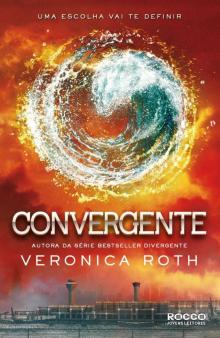 Allegiant
Allegiant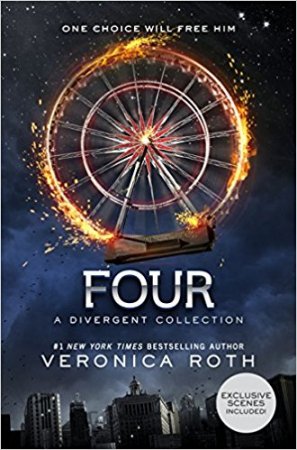 Four: A Divergent Collection
Four: A Divergent Collection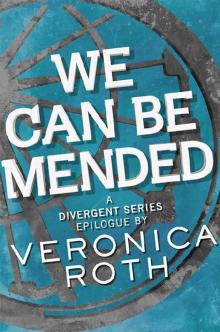 We Can Be Mended
We Can Be Mended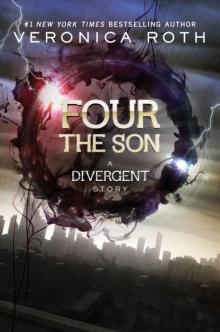 The Son
The Son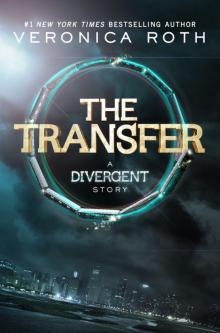 The Transfer
The Transfer The Traitor
The Traitor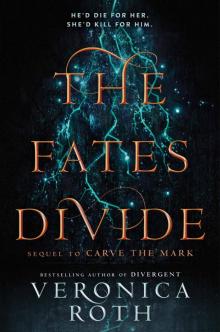 The Fates Divide
The Fates Divide Chosen Ones
Chosen Ones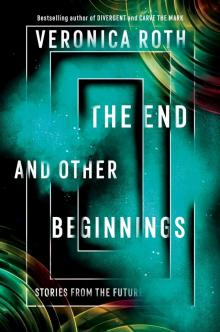 The End and Other Beginnings
The End and Other Beginnings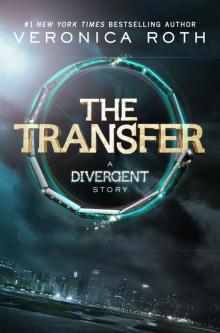 The Transfer: A Divergent Story
The Transfer: A Divergent Story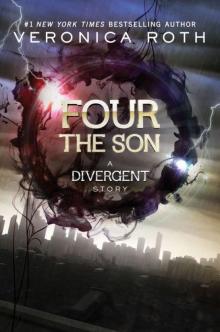 Four_The Son
Four_The Son Divergent dt-1
Divergent dt-1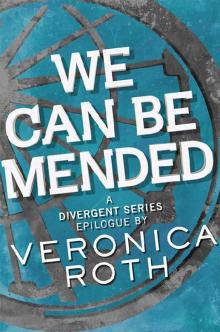 We Can Be Mended_A Divergent Story
We Can Be Mended_A Divergent Story![Ark [Forward Collection] Read online](http://i1.bookreadfree.com/i1/03/31/ark_forward_collection_preview.jpg) Ark [Forward Collection]
Ark [Forward Collection] Four_The Traitor
Four_The Traitor 10.22.13_The World of Divergent_The Path to Allegiant
10.22.13_The World of Divergent_The Path to Allegiant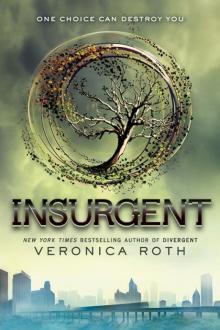 Insurgent (Divergent)
Insurgent (Divergent) The Divergent Series Complete Collection
The Divergent Series Complete Collection Divergent Collector's Edition
Divergent Collector's Edition Four_The Initiate
Four_The Initiate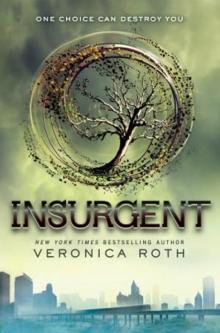 Insurgent d-2
Insurgent d-2